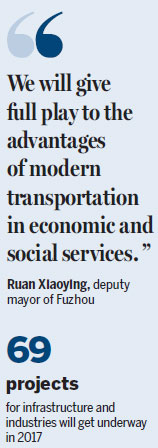Policies launched to aid building of Binhai New City

Fuzhou has launched a package of supporting policies to boost the ongoing construction of its new district alongside the coastal line.
The new district, known as Binhai New City, will be built in Changle, a county-level city in Fuzhou, capital city of Fujian province.
"The development program of Binhai New City will play a leading role in transforming and optimizing Fuzhou's industries, and also in Fuzhou's urban construction and upgrade," said Huang Zhongyong, executive deputy director of Binhai New City's management committee.
Huang made the remarks at the inauguration ceremony for the construction of the new city on Feb 13.
Huang released the information about the first batch of fixed-asset investment projects in Binhai New City, which include 80 projects worth more than 200 billion yuan ($29.13 billion) in combined investment.
Sixty-nine of these projects will get underway in 2017, at a cost of more than 150 billion yuan, according to Huang.
The first of the fixed-asset investment projects concerns infrastructure construction, including land preparation, upgrading the traffic system, as well as the water and electricity supply and public amenity services.
The main purpose of land preparation is to serve the first stage of construction of Binhai New City and Xiasha tourist holiday zone.
The local government will offer 900 hectares of land for the initial phase of Binhai New City, which will include land bought from local farmers and through the relocation of local residents, as well as land leveling.
For the traffic system, the government will "make efforts to build a multi-level, comprehensive transportation system, which integrates highways, (overland) trains, subways, airports and harbors," said Ruan Xiaoying, deputy mayor of Fuzhou.
"We will give full play to the advantages of modern transportation in economic and social services, to create a modern transportation network suitable for both residents and business logistics," Ruan said.

Construction work on three highways has already been completed, and a further three are currently under construction. The completed projects include the six-lane Airport Expressway and the six-lane 316 National Highway that link Binhai and Fuzhou old town, as well as the four-lane 201 Provincial Highway that runs from north to south in Binhai New City.
Projects under construction include the Changping Expressway, a 22-kilometer road that starts in Guhuaiqiantang in Changle and ends in Songxia Port. It is designed as a two-way six-lane expressway that will eventually extend to the island county of Pingtan through a long cross-sea bridge, which is currently under construction.
Construction on another expressway that also starts from Guhuaiqiantang, namely Changfu Expressway, began in December. It will connect Luolian, Longshan, Haikou, Longtian, Shangjing and ends in Fuqing. The total cost of the 41-km highway will reach 5.8 billion yuan.
The local government of Fuzhou has also drawn up plans for two highways to connect the city's old town with Binhai New City. These two projects will cost 13.9 billion yuan in total.
In terms of railways construction work, Fuping Railway, which will connect Fuzhou Railway Station, Changle county, Songxia Port and Pingtan Cross-Sea Bridge, will be opened in June 2019.
Subways are also an important part of Binhai's overall development project. Subway Line 6, a 41-km subway that connects Fuzhou city center, Binhai New City, the old town district of Changle, and Fuzhou Changle International Airport will be opened before the end of 2020, according to Ruan.
In addition, Fuzhou Changle International Airport will build its second runway and new ancillary facilities. With a total investment of 18 billion yuan, the airport will be capable of serving 28.5 million passengers per year.
Besides transportation facilities, Huang said the government will also build new sewage plants and pipelines, as well as new power substations to ensure a constant and high-quality supply of both water and electricity in Binhai New City.
The local government has also launched a number of public amenity construction projects, which will result in new hotels, schools, hospitals and sanatoriums.
To date, 32 companies specializing in big data and virtual reality have based their operations in Binhai New City, according to Huang.
They include the 360 Industrial Park, and subsidiaries by Inspur Group and Storm Video. These companies have brought in more than 70 billion yuan in total investment.
Ruan said the government will also launch more construction projects, which will result in new harbors, natural gas supply facilities and residential buildings, to ensure that Binhai New City develops in a way that benefits everyone.
humeidong@chinadaily.com.cn
(China Daily 02/22/2017 page16)














